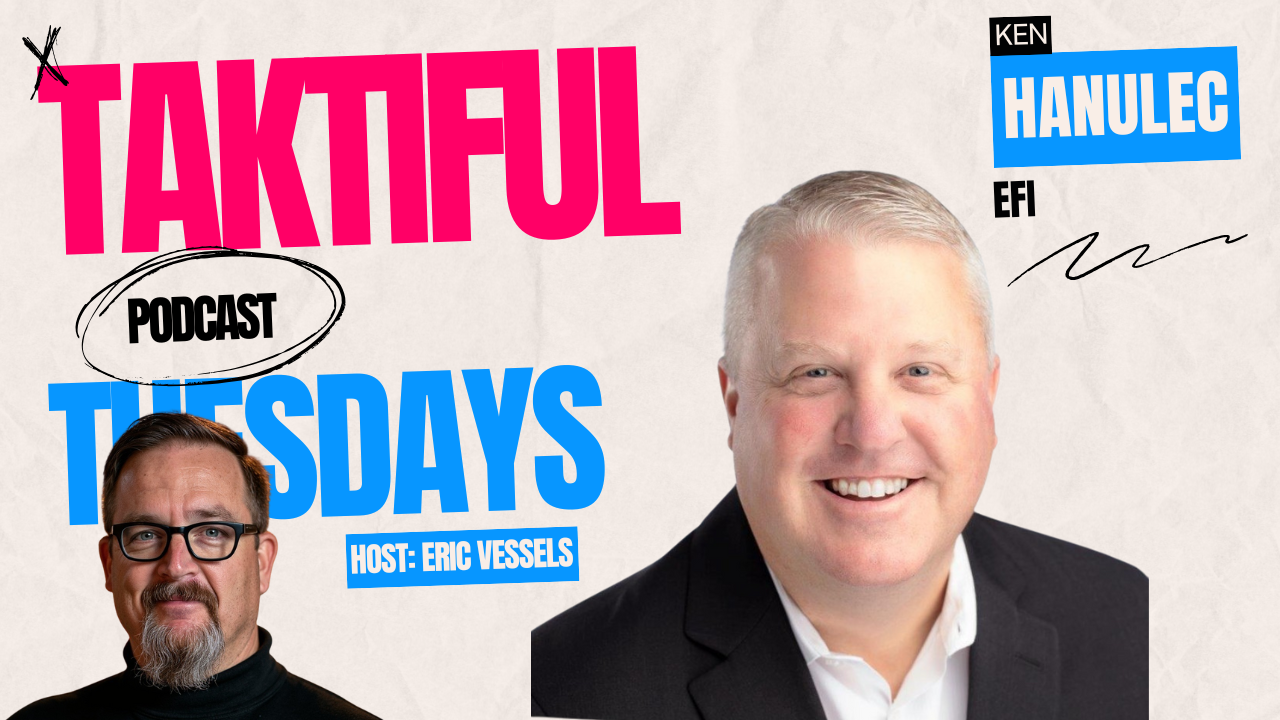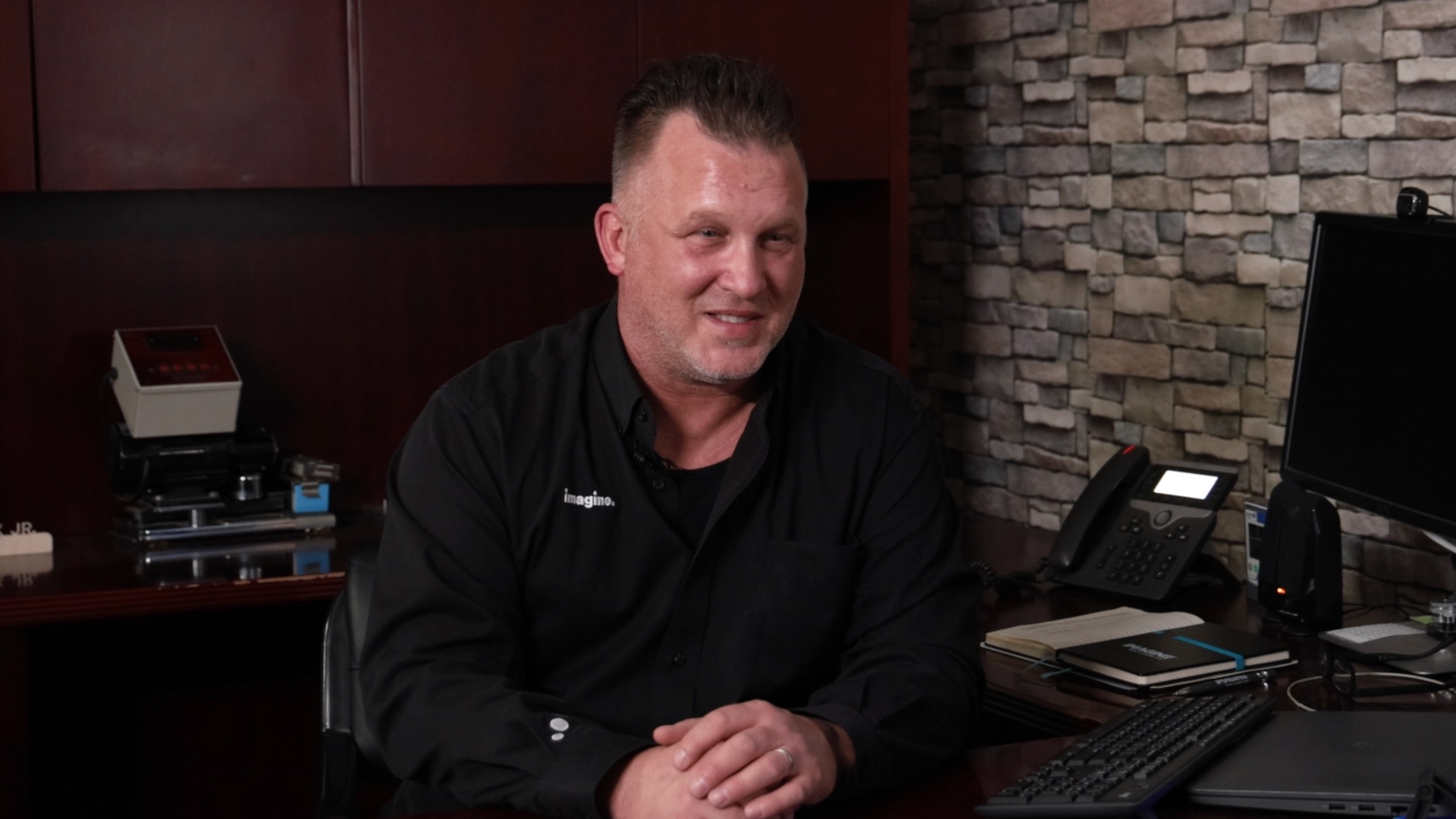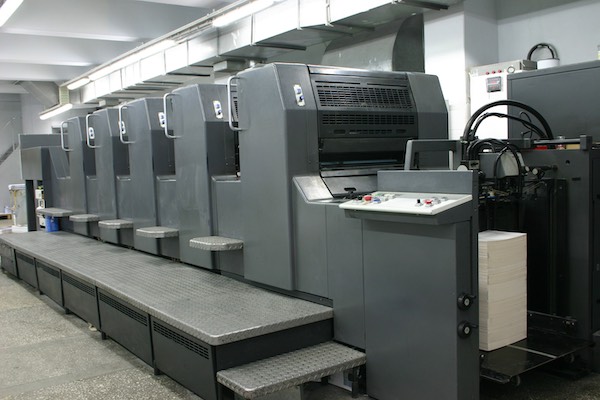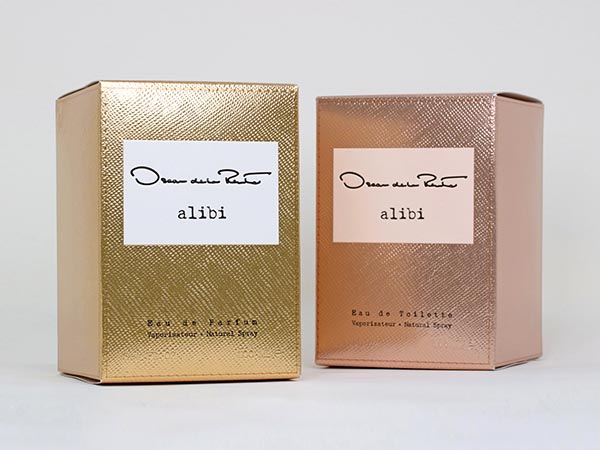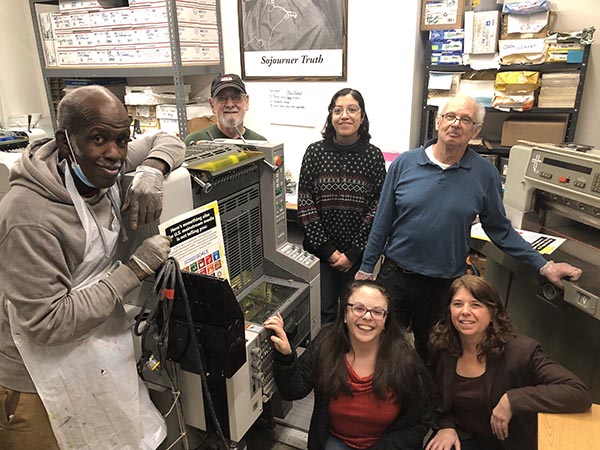
With the Ryobi 3304H four-color offset press recently installed at Women’s Press Collective are, clockwise from left, volunteers Sidney Malone, Tim Dalton, Valeria Lopez, Robert Gilman, Lisa Daniell, and Stephanie Lemonik.
Thanks to the help of some good friends in the printing industry, Women’s Press Collective (WPC) now owns and operates the piece of equipment that’s most central to its identity and its mission: a four-color offset press.
The press—a seasoned but still capable Ryobi 3304H—is the latest in a series of donations that enable the Bronx-based group to bring the power of print to those who will use it to advance social causes and promote independent journalism.
The full-color press is helping to advance an essential part of WPC’s free-of-charge benefit program to its members—providing training in the skills of publication production. This consists of teaching non-professional people how to print, giving them the means to do it, and certifying them to teach printing to others—all without charge, and all with democratizing the medium of print as the ultimate goal.
Before the Ryobi 3304H began running off its first jobs at the beginning of last December, WPC had relied on a two-color Ryobi 3202 surrounded by a complement of analog prepress and postpress equipment.
This machinery, like much of the paper, consumables, and other assets the group puts at the disposal of the community-based organizations that have signed up as members, came to the shop entirely through the generosity of print industry professionals who believe in the work that WPC is doing.
A Digital Dividend
The addition of the Ryobi 3304H illustrates how WPC’s network of supporters and volunteers sustains it as an all-volunteer organization that neither seeks nor receives government funding of any kind.
One such supporter is Leonard Popkin, owner of Jack L. Popkin & Co., a print equipment dealer that has served the New York City metropolitan area since 1983. Popkin, who pitches in as WPC’s volunteer press repairman, knew that one of his customers, the Bronx Design Group, had converted to digital printing and no longer needed the Ryobi 3304H it had operated for more than 20 years.
A family owned and operated business since 1991, the Bronx Design Group serves clients ranging from nonpro?ts and corporate accounts to municipal organizations and small businesses. Offerings include graphic design, commercial and social printing, large format media and promotional items.
The company has been certified for more than 10 years by New York City and New York State as a Minority- and Women-Owned Business Enterprise (MWBE). Shortly after Popkin put Geri Sciortino, owner, in touch with WPC, the Ryobi 3304H was on its way to an offset-friendly new home.
Keeping the Craft Alive
“We no longer needed the use of our offset press and were looking for someone who could make good use of it, since it was in excellent condition,” Sciortino says. “One of our employees was trained by Women's Press Collective and told us about the organization and the guidance he received.
“Since Women’s Press Collective was actively teaching the printing trade to a new generation, we thought they would be the perfect recipients of our press.”
“They saw that we would keep the craft alive,” says Lisa Daniell, WPC’s operations manager.
The group then raised funds to transport the press and to arrange space for it in the WPC pressroom, located in the Kingsbridge section of the Bronx. Popkin prepared the press for its move, and Pedowitz Machinery Movers provided the trucking and rigging services at a discount.
Delivery took place on May 16, 2023, with the 6,600-lb., 12-ft. long press arriving in two pieces. Daniell says the Ryobi 3304H was “overall in very beautiful condition.” It had logged a relatively low four million impressions and showed evidence of having been very well maintained by its original owner.
Petitions in Print
Installation was complete in September, and in December, the press ran its first formal job: a full-color poster urging the U.S. government to do its fair share of implementing the “2030 Agenda for Sustainable Development,” a plan adopted by all member nations of the United Nations in 2015.
The press is being used to print full-color covers for WPC’s magazine, Collective Endeavor—a project not feasible to run on the shop’s two-color Ryobi 3202, which remains in service. It also printed colorful invitations and programs for WPC’s celebration of International Women’s Day on March 8.
The augmented pressroom will continue to rely on outside contributions to keep the cylinders turning.
Daniell cites the generosity of suppliers like Ryobi Press Parts of Carmel, Ind., which furnished plate clamps and other key components; and John Miroddi of the Miroddi Group, a Manhattan printing firm that provides the negative film the WPC pressroom uses to expose offset plates in a vintage nuArc flip-top vacuum frame platemaker.
Daniell adds that the group is “eternally grateful to members of the paper industry,” including Sappi, Monodnock, Lindenmeyr Central, and Shulman Paper among others, for ongoing donations of substrates.
Production takes place mostly on Saturdays to accommodate the schedules of unpaid volunteer press operators such as local industry veterans Sidney Malone, Jose Vega, Pedro Peguero, Rafael Espinar, and Tim Dalton, who double as press instructors.
One of WPC’s core beliefs is that training non-specialists in presswork is fundamental to giving people an independent voice among corporately controlled media that don’t adequately report needs and concerns at the grassroots.
This is the rationale for an offset press training program that breaks the process into a set of 40 skills that students—who typically have had no prior exposure to printing—are expected to master and then pass on to other trainees. Eight hours of hands-on experience per week in the WPC pressroom over two to three months earns certification as an operator/trainer.
With the disappearance of union training centers, commercial schools for vocational careers, and academic programs in print production, offset press certification from WPC may be the only educational opportunity of its kind left in the New York City metropolitan area for those who don’t belong to the printing industry. The group is keen to enlist more volunteer press operators to keep its train-the-trainer initiative going strong.
What Else Would Help
Also sought is a donation of a CTP unit that will let the pressroom graduate from its film-based platemaking workflow to direct-to-plate, especially now that four-color production has stepped up the amount of stripping that needs to be done.
Equally welcome would be donations of plates and related chemistry. A print shop willing to mingle WPC’s press rags with its own for cleaning would be doing the Bronx pressroom another great favor.
Founded in 1982 by a group of women with backgrounds as labor organizers, WPC strives to represent and advance the interests of low-paid working women everywhere.
It also provides publication training to support community-based organizations seeking economic fairness and social reform on behalf those whose stories and struggles often tend to be underreported by the major media.
Education has always been a mainstay of its activity, with training offered in prepress, graphic design, and journalistic writing as well as printing.
At its Bronx headquarters, the group maintains an 1,800-volume library on subjects germane to its mission. A long-standing relationship with the graphic studies program at New York City College of Technology (NYCCT) provides valuable internship opportunities for City Tech students.
WPC is the recipient of grants from the Print & Graphics Scholarship Foundation (PGSF) and the Graphic Communications Scholarship Foundation (GCSF) in recognition of its efforts to promote the study and use of printing.
Others in the industry wishing to support the group with donations of time and/or resources are invited to call 718-543-5100. Its web site is http://www.womenspresscollective.org/; the e-mail address is [email protected].
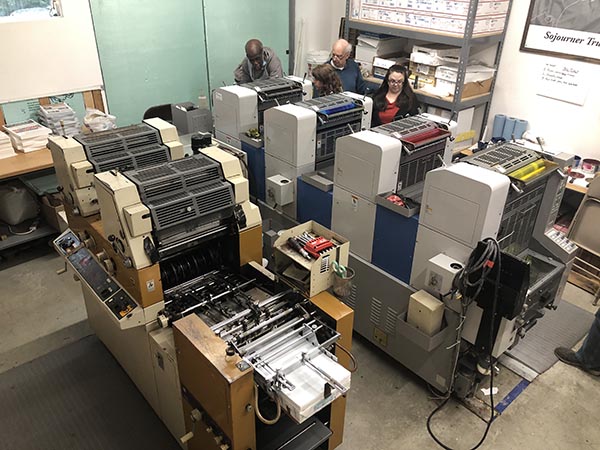
The Ryobi 3304H operates side by side with a two-color Ryobi 3202 in Women’s Press Collective’s Bronx pressroom.

